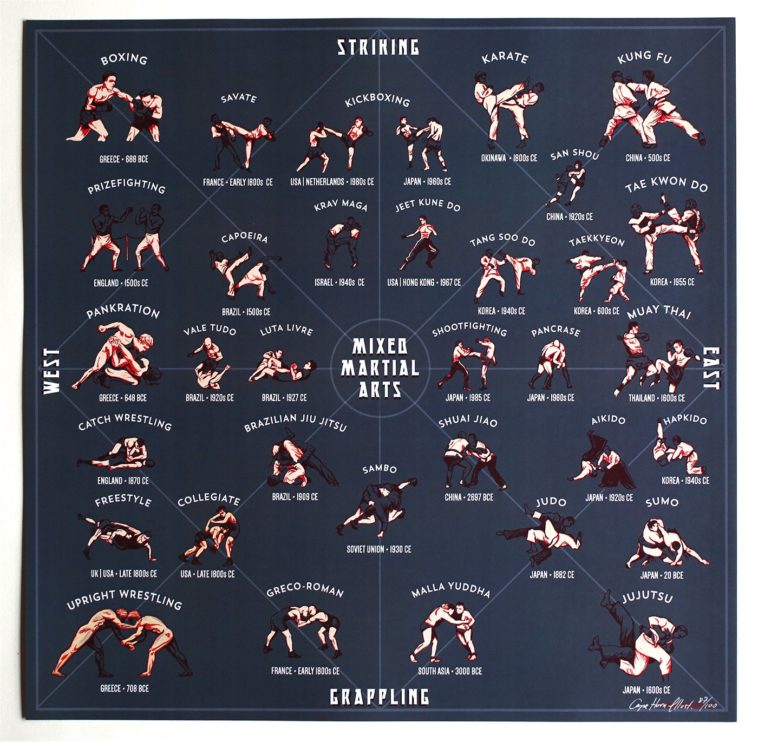Checking Out The Rich Heritage And Spiritual Dimension Of Fighting Style: A Comprehensive Examination
Checking Out The Rich Heritage And Spiritual Dimension Of Fighting Style: A Comprehensive Examination
Blog Article
Team Author-Rafferty Wall
Enter the ancient world where martial arts were born out of necessity in diverse areas. Cultures crafted one-of-a-kind combating designs intertwined with historic contexts. Strategies progressed over centuries via devoted technique and cultural exchanges. Today, contemporary martial arts blend standard components for maximum performance. Philosophically, martial arts emphasize technique, self-improvement, and consistency. Respect, humbleness, and equilibrium are fundamental principles leading specialists in the direction of growth and strength. Discover the depths of this abundant history and viewpoint to reveal the profound impacts shaping this enduring self-control.
Origins of Martial Arts
Fighting style originated in numerous regions worldwide, progressing as useful battle systems to defend against hazards. These old combating styles were developed out of need, with each culture crafting strategies suited to their unique environments and difficulties. From the grappling arts of Jujutsu in Japan to the striking techniques of Martial art in China, martial arts were deeply intertwined with the historic, social, and social fabric of their corresponding cultures.
In Japan, the samurai class polished martial arts like Kenjutsu, the art of the sword, which later on developed into the much more promoted kind of Kendo. On the other hand, in Brazil, Capoeira became a mix of dancing and battle, developed by enslaved Africans as a means to withstand injustice. Each fighting style brings with it an abundant history and ideology, mirroring the values and ideas of individuals that practiced them.
As you look into the origins of martial arts, you reveal a tapestry of human resourcefulness, strength, and the unyielding spirit of warriors throughout time.
Development of Techniques
Via centuries of practice and refinement, battle strategies within various martial arts have undergone a profound evolution. From ancient designs like Kung Fu and Karate to more modern self-controls such as Brazilian Jiu-Jitsu and Krav Maga, the advancement of strategies has actually been driven by a combination of cultural influences, practical applications, and technological innovations.
One considerable facet of this evolution is the cross-pollination of methods in between various martial arts. For instance, methods from traditional Japanese Jiu-Jitsu were included into the production of Judo by Jigoro Kano in the late 19th century. This mixing of styles has actually caused the development of hybrid martial arts like Mixed Martial Arts (MIXED MARTIAL ARTS), which incorporate components of striking, grappling, and entry strategies.
Additionally, the development of strategies has been formed by the boosting focus on performance and performance in combat. Experts have actually constantly looked for to improve their techniques with rigorous training, experimentation, and competition, resulting in the development of highly specialized and reliable fighting styles. Overall, the development of strategies in martial arts reflects the dynamic nature of fight and the continuous quest for improvement and advancement.
Thoughtful Foundations
Exploring the underlying thoughtful principles of martial arts supplies insight into their core values and guiding ideas. At https://elliotgovah.activoblog.com/31160347/college-students-benefit-dramatically-from-taking-self-defense-courses-learn-how-these-courses-can-aid-trainees-attend-to-possible-risks-and-improve-their-sense-of-empowerment of many martial arts self-controls is the principle of discipline itself. By training your mind and body to act as one cohesive system, you cultivate discipline that expands past the dojo or gym right into everyday life. This technique encompasses regard, humbleness, and self-control, forming not just your physical abilities but also your personality.
Another basic philosophical foundation in martial arts is the concept of continual self-improvement. https://indianexpress.com/article/lifestyle/fitness/urvashi-rautela-martial-arts-staff-bojutsu-technique-benefits-7514931/ of grasping a fighting style is perpetual, with professionals continuously striving to better themselves, both literally and mentally. This focus on development cultivates strength, perseverance, and a growth way of thinking that can be put on all elements of life.
Additionally, martial arts stress the importance of harmony and balance. Methods are developed to make use of a challenger's power versus them, highlighting the concept of generating and redirecting force as opposed to meeting it head-on. This viewpoint includes social relationships, promoting calm resolutions and mutual understanding. By welcoming these philosophical foundations, martial artists not just enhance their battle skills yet additionally grow a way of life centered on individual development, regard, and consistency.
Verdict
Finally, the history and viewpoint of martial arts use an abundant tapestry of custom, technique, and self-improvement.
Take for example the tale of Bruce Lee, that changed martial arts by blending different styles and viewpoints to produce his own one-of-a-kind type of Jeet Kune Do.
Through commitment and innovation, martial artists continue to push boundaries and influence others to reach their full capacity both in fight and in life.
